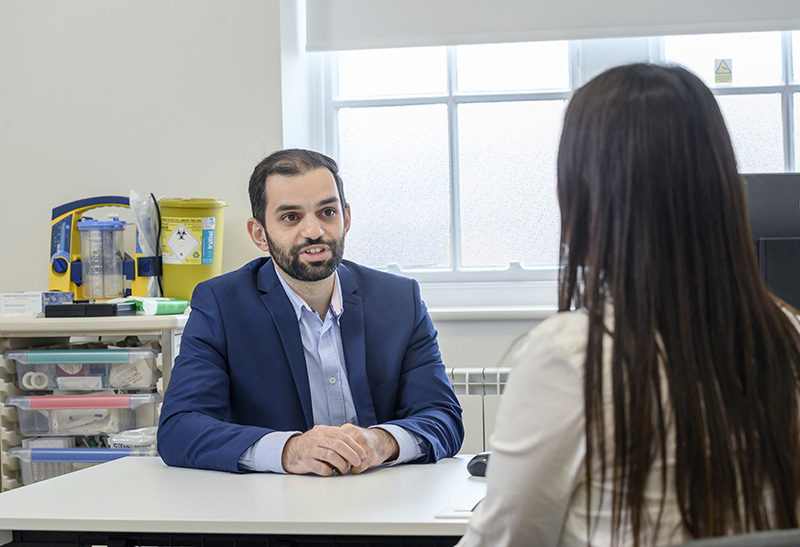Contents
Fibromyalgia
Fibromyalgia is a long-term condition that causes widespread musculoskeletal pain, fatigue, and a range of other physical and psychological symptoms. It is often difficult to diagnose and manage, as symptoms can overlap with other chronic conditions.
At The New Foscote Hospital in Banbury, our consultants provide a supportive, multidisciplinary approach to diagnosing and treating fibromyalgia, with the aim of improving quality of life and reducing daily symptom impact.
What is Fibromyalgia?
Fibromyalgia affects how the nervous system processes pain signals, resulting in an increased sensitivity to pain across the body. It does not cause tissue damage or inflammation but significantly affects how individuals feel and function.
Although the exact cause is unknown, fibromyalgia is believed to involve a combination of genetic, environmental, and neurological factors. Stress, trauma, infections, or autoimmune conditions can act as potential triggers.
Common Symptoms of Fibromyalgia
Symptoms can vary in intensity and may fluctuate over time. The most common include:
- Persistent, widespread pain across muscles and joints
- Extreme fatigue or exhaustion
- Sleep disturbances, including non-restorative sleep
- Cognitive difficulties (often referred to as “fibro fog”)
- Sensitivity to temperature, noise or light
- Headaches, including migraines
- Irritable bowel symptoms
- Anxiety or low mood
- Numbness or tingling sensations in hands and feet
- Stiffness, particularly in the morning
The severity of symptoms can be unpredictable, often worsening with stress, physical exertion, or disrupted sleep.
What Causes Fibromyalgia?
While the cause remains unclear, contributing factors may include:
- Abnormal pain signal processing in the brain and spinal cord
- A family history of fibromyalgia
- Traumatic physical or emotional events
- Hormonal imbalances or neurological disorders
- Coexisting conditions such as arthritis or lupus
- Long-term stress or anxiety
It is more common in women and typically develops between the ages of 30 and 60, although it can affect people of any age.
Diagnosis at The New Foscote Hospital
There is no single test for fibromyalgia. Diagnosis is based on medical history, symptom patterns, and exclusion of other conditions. Our consultants carry out a full evaluation, which may include:
- Physical examination and symptom mapping
- Blood tests to rule out inflammatory or autoimmune conditions
- Review of sleep quality and psychological wellbeing
- Diagnostic imaging if other conditions are suspected
We take a holistic approach, recognising the wide-ranging impact fibromyalgia can have on daily life.
Treatment Options
There is currently no cure for fibromyalgia, but symptoms can be effectively managed through a combination of medical and lifestyle interventions. At The New Foscote Hospital, our care pathway may include:
Non-pharmacological support:
- Physiotherapy – gentle exercise and stretching to improve mobility and reduce stiffness
- Occupational therapy – advice on activity pacing and energy conservation
- Cognitive behavioural therapy (CBT) – support for managing the emotional impact
- Sleep management strategies – to improve rest and reduce fatigue
Medical treatment:
- Pain relief medication, such as low-dose antidepressants or neuropathic agents
- Treatment for associated conditions like irritable bowel syndrome, headaches, or depression
- Referral to specialist pain management services where appropriate
We focus on improving long-term coping strategies, functionality, and symptom control.

Our Team and Facilities
- Patients at The New Foscote Hospital have access to:
- A caring, patient-centred approach
- Specialist rheumatology and pain consultants
- Experienced physiotherapists and psychologists
- On-site imaging and diagnostics
- Comfortable, private consulting rooms
18 June 2025
